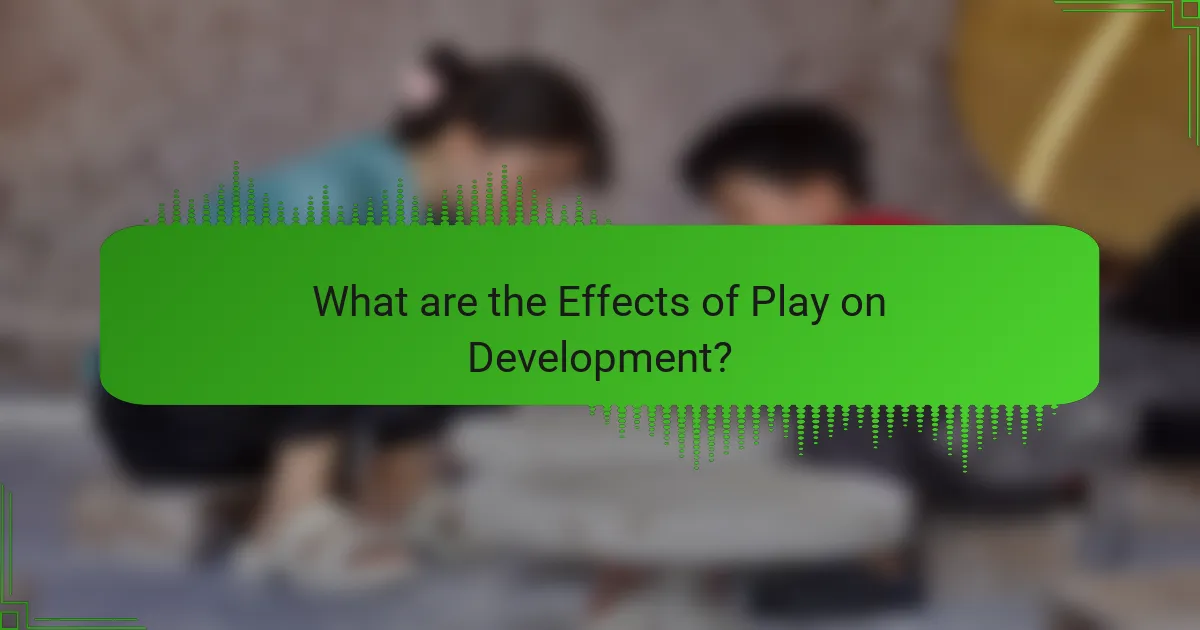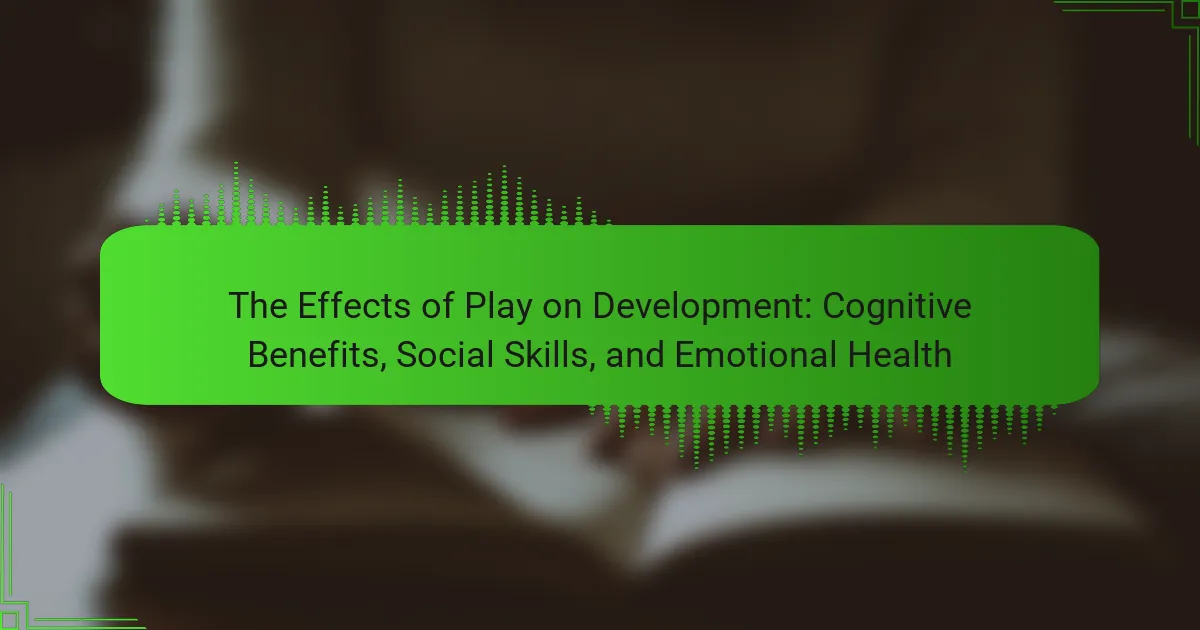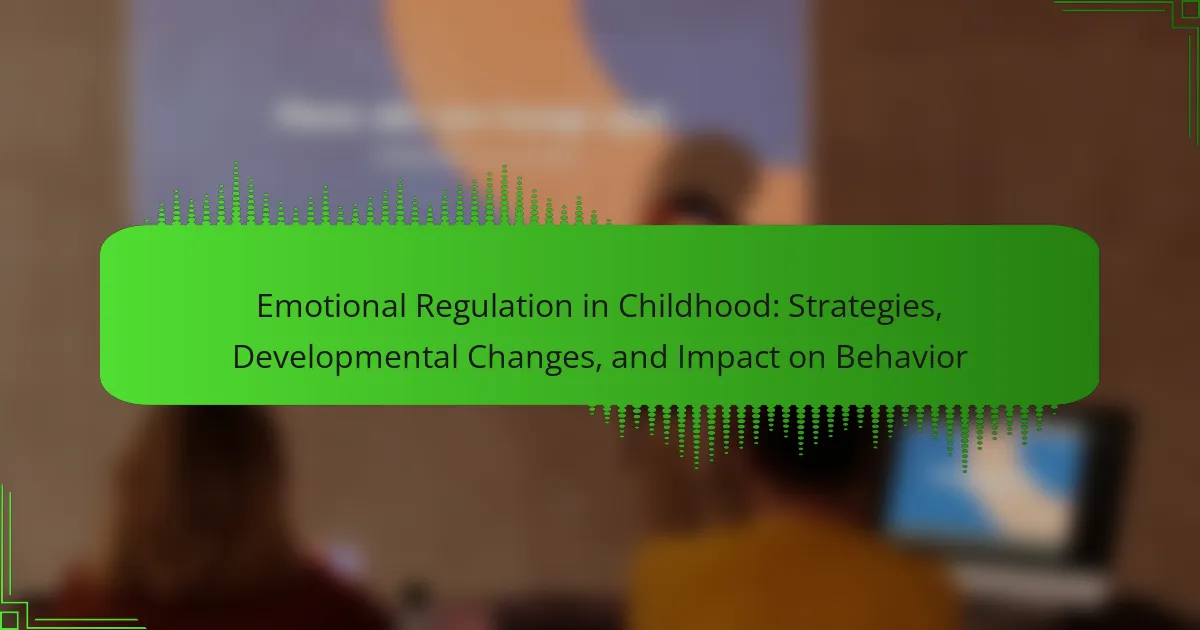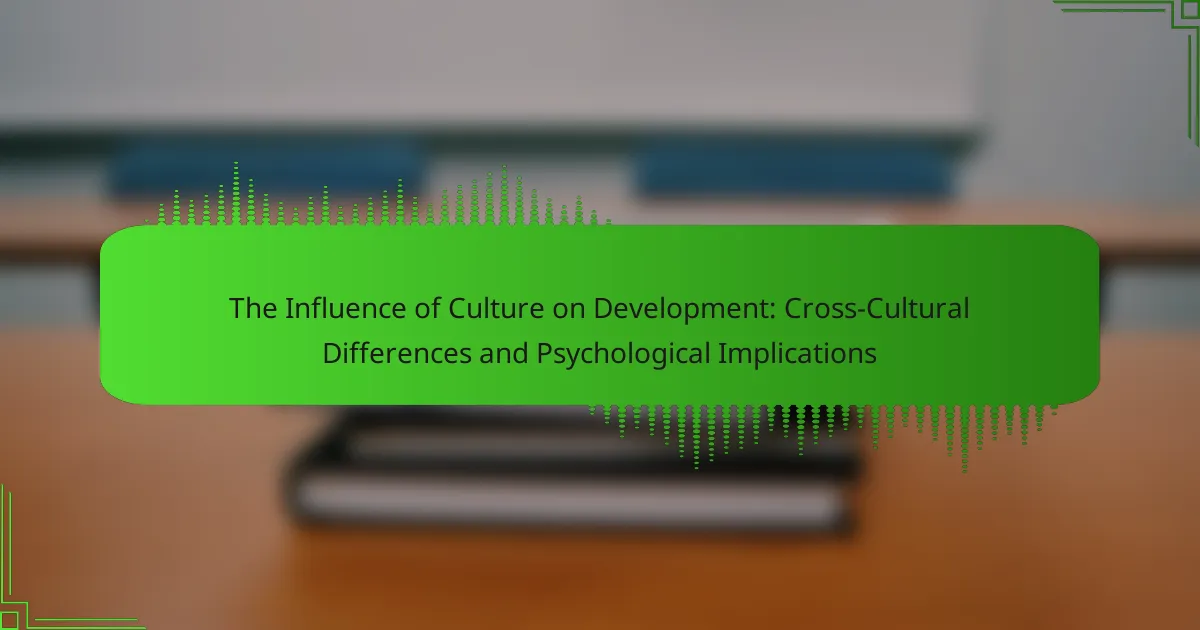Play is a crucial entity in child development, influencing cognitive abilities, social skills, and emotional health. Engaging in play enhances problem-solving skills and creativity, allowing children to learn through exploration and experimentation. It also fosters social interactions that improve cooperation and conflict resolution. Additionally, play serves as a vital outlet for emotional expression, contributing to better emotional regulation and resilience. Research, including findings from “Child Development,” underscores the link between play and enhanced emotional and social competence in preschoolers.

What are the Effects of Play on Development?
Play significantly impacts development across various domains. It enhances cognitive abilities by fostering problem-solving skills and creativity. Engaging in play allows children to explore their environment and learn through experimentation. Social skills are improved through interactions during play, as children learn to cooperate and resolve conflicts. Emotional health benefits arise from play, providing a safe outlet for expressing feelings and reducing anxiety. Research indicates that children who engage in regular play exhibit better emotional regulation and resilience. For example, a study published in the journal “Child Development” found that play contributes to emotional and social competence in preschoolers.
How does play influence cognitive development?
Play significantly influences cognitive development by enhancing critical thinking, problem-solving skills, and creativity. Engaging in play activities stimulates brain development through interaction and exploration. For example, children who participate in imaginative play demonstrate improved cognitive flexibility. Research indicates that play fosters language skills as children communicate and negotiate roles. Additionally, play encourages social interactions that develop emotional intelligence. A study by Pellegrini and Gustafson found that play contributes to better academic performance in children. These findings highlight the essential role of play in shaping cognitive abilities during formative years.
What specific cognitive skills are enhanced through play?
Play enhances several specific cognitive skills. These include problem-solving abilities, critical thinking, and creativity. Through play, children learn to navigate challenges and develop strategies. They also improve their memory and attention span during engaging activities. Research indicates that play fosters language development and communication skills. Additionally, social play enhances collaboration and negotiation abilities. Studies show that children who engage in play demonstrate better academic performance. Overall, play is essential for cognitive development and skill enhancement.
How do different types of play contribute to cognitive growth?
Different types of play significantly contribute to cognitive growth. Active play enhances problem-solving skills and promotes critical thinking. For instance, children engaging in role-play develop narrative skills and creativity. Constructive play, such as building with blocks, fosters spatial awareness and logical reasoning. Social play encourages communication and collaboration, which are essential for cognitive development. Research shows that children who participate in diverse play activities demonstrate improved academic performance. A study by Pellegrini and Gustafson (2005) indicates that play enhances cognitive flexibility and memory. Thus, various play types are crucial for fostering cognitive abilities in children.
What role does play have in developing social skills?
Play is essential for developing social skills. Through play, children learn to interact with peers and navigate social situations. They practice communication, cooperation, and conflict resolution during play activities. Engaging in group play fosters empathy and understanding of others’ perspectives. Research indicates that children who engage in play show improved social competence. A study by Pellegrini and Gustafson (2005) found that play enhances children’s ability to form friendships. Furthermore, play encourages sharing and taking turns, which are crucial social skills. Overall, play serves as a foundational platform for social development in children.
How does play facilitate communication and interaction among peers?
Play facilitates communication and interaction among peers by providing a shared context for social engagement. During play, children use verbal and non-verbal cues to express thoughts and feelings. This interaction enhances language skills and helps develop empathy. For example, role-playing scenarios encourage children to navigate social situations. Research shows that children who engage in play demonstrate better conflict resolution skills. A study by Pellegrini and Gustafson (2005) indicates that play fosters cooperation and negotiation among peers. These interactions build social bonds and improve overall communication skills. Thus, play serves as a vital medium for peer interaction and communication development.
What types of play are most effective for social skill development?
Types of play that are most effective for social skill development include cooperative play, role-playing, and games with rules. Cooperative play encourages children to work together towards a common goal. This fosters communication and teamwork skills. Role-playing allows children to explore different perspectives and practice empathy. Engaging in games with rules teaches children about taking turns, following guidelines, and resolving conflicts. Research shows that these types of play contribute significantly to social competence. A study published in the journal “Child Development” by Ginsburg (2007) emphasizes the importance of play in developing social skills.
How does play impact emotional health in children?
Play significantly impacts emotional health in children. It allows children to express their feelings and cope with stress. Engaging in play fosters social skills and emotional resilience. Children learn to navigate complex emotions through role-playing and imaginative scenarios. Research shows that play reduces anxiety and depression symptoms in young ones. A study by the American Academy of Pediatrics found that play enhances emotional regulation. It also promotes self-esteem and confidence in children. Overall, play is essential for healthy emotional development.
What emotional skills are developed through play activities?
Play activities develop several emotional skills, including empathy, self-regulation, and resilience. Through imaginative play, children learn to understand others’ feelings, fostering empathy. Engaging in cooperative games teaches self-regulation as children navigate rules and take turns. Resilience is built as children experience wins and losses, learning to cope with disappointment. Research indicates that these skills are critical in emotional development. A study by Pellegrini and Gustafson (2005) highlights that play is essential for emotional growth in early childhood.
How can play serve as a coping mechanism for children?
Play serves as a coping mechanism for children by allowing them to express emotions and process experiences. Through play, children can reenact situations that may be stressful or confusing. This reenactment helps them to make sense of their feelings. Engaging in play can also provide a sense of control over their environment. For instance, imaginative play allows children to create scenarios and outcomes. Research indicates that play can reduce anxiety and improve emotional regulation. A study published in the journal “Child Development” found that children who engage in play show better coping skills in stressful situations. Therefore, play is a vital tool for emotional health in childhood.
How do cognitive, social, and emotional benefits of play interconnect?
Cognitive, social, and emotional benefits of play are interconnected through their collective impact on child development. Play enhances cognitive skills by fostering problem-solving and critical thinking. When children engage in play, they develop social skills through interaction with peers. These interactions build communication and cooperation abilities. Emotional benefits arise as children express feelings and learn empathy during play. The combination of these benefits creates a holistic development environment. Research indicates that play promotes brain development, social competence, and emotional regulation. For example, a study by Pellegrini and Gustafson (2005) found that play contributes significantly to cognitive and social growth in children.
What are the long-term effects of play on overall development?
Play significantly influences overall development in children. It fosters cognitive growth by enhancing problem-solving skills and creativity. Engaging in play helps develop social skills, such as cooperation and conflict resolution. Children learn to communicate effectively through interactive play scenarios. Emotional health benefits include improved self-regulation and resilience. Research indicates that regular play contributes to better academic performance in later years. A study by Pellegrini and Gustafson (2005) found that play is essential for developing social competence. Overall, play serves as a foundational element for lifelong learning and interpersonal relationships.
What best practices can parents and educators adopt to promote play for development?
Parents and educators can promote play for development by providing diverse play opportunities. Structured play, such as games with rules, enhances cognitive skills. Unstructured play allows for creativity and problem-solving. Outdoor play encourages physical activity and social interaction. Incorporating play into learning can increase engagement and retention. Parents should limit screen time to encourage active play. Educators can create play-based curricula to foster collaboration among students. Research shows that play improves emotional regulation and resilience in children. The American Academy of Pediatrics emphasizes the importance of play in child development.
The main entity of the article is ‘the effects of play on development’, which encompasses cognitive benefits, social skills, and emotional health. The article highlights how play enhances cognitive abilities, problem-solving skills, and creativity, while also fostering social interactions and emotional resilience in children. It discusses the specific cognitive skills enhanced through different types of play, the role of play in developing social skills, and its impact on emotional health. Additionally, it covers the interconnectedness of cognitive, social, and emotional benefits of play and provides best practices for parents and educators to promote play for optimal development.



